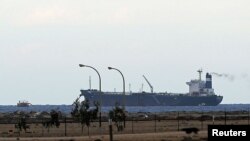Libyan officials said their forces have intercepted a tanker carrying crude oil that a separatist militia was trying export in defiance of a government ban.
Culture minister and government spokesman Habib al-Ameen said Monday that Libya's navy had "completely secured" the ship.
"The authorities, until this moment, are very clearly in control of the tanker, and the tanker is safe and fully protected by the Libyan naval forces, no one from the other side can come close to it," said al-Ameen.
The tanker had been docked at the militia-controlled eastern port of As-Sidra since Saturday.
Prime Minister Ali Zeidan said Monday the navy was leading the tanker to a western port controlled by the government.
A rebel spokesman denied they had lost control of the ship.
The vessel - Morning Glory - is North Korea-flagged, but it is not clear who actually owns it. Shipping sources say it is a flag of convenience to keep ownership secret.
Also on Monday, Libya's parliament ordered special forces to deploy within a week to "liberate" all rebel-held ports in the country's volatile east.
The head of parliament, Nuri Ali Abu Sahmain, who has quasi-presidential powers, ordered the formation of a force made up of regular soldiers and allied militias to take back the ports, which previously handled a total of more than 700,000 barrels of oil per day.
Militias have controlled Libya's major ports for the last eight months, causing a sharp drop in the country's oil exports. The output has fallen from about 1.5 million barrels per day to about 250,000 barrels per day.
In New York, the head of the United Nations mission in Libya told the U.N. Security Council there has been a "dramatic" rise in violence in Libya in the past three months. Tarek Mitri said the country is at risk of experiencing "a new trajectory of unprecedented violence."
He said Libya needs support for its democratic transition, and highlighted lingering disagreements over future elections, rebuilding the army and integrating fighters who helped oust former leader Moammar Gadhafi.
Analysts think the Libyan military would likely struggle to overcome rebels, many of whom have combat experience from the 2011 uprising that toppled Gadhafi. The rebels have kept their weapons and now challenge state authority.
The oil dispute is just one facet of the deepening turmoil in the North African OPEC-member nation.
Bringing Libya’s factions and heavily-armed militias together under one flag continues to pose a great challenge. Analysts say the consequences of failure would affect the entire region.
Culture minister and government spokesman Habib al-Ameen said Monday that Libya's navy had "completely secured" the ship.
"The authorities, until this moment, are very clearly in control of the tanker, and the tanker is safe and fully protected by the Libyan naval forces, no one from the other side can come close to it," said al-Ameen.
The tanker had been docked at the militia-controlled eastern port of As-Sidra since Saturday.
Prime Minister Ali Zeidan said Monday the navy was leading the tanker to a western port controlled by the government.
A rebel spokesman denied they had lost control of the ship.
The vessel - Morning Glory - is North Korea-flagged, but it is not clear who actually owns it. Shipping sources say it is a flag of convenience to keep ownership secret.
Also on Monday, Libya's parliament ordered special forces to deploy within a week to "liberate" all rebel-held ports in the country's volatile east.
The head of parliament, Nuri Ali Abu Sahmain, who has quasi-presidential powers, ordered the formation of a force made up of regular soldiers and allied militias to take back the ports, which previously handled a total of more than 700,000 barrels of oil per day.
Militias have controlled Libya's major ports for the last eight months, causing a sharp drop in the country's oil exports. The output has fallen from about 1.5 million barrels per day to about 250,000 barrels per day.
In New York, the head of the United Nations mission in Libya told the U.N. Security Council there has been a "dramatic" rise in violence in Libya in the past three months. Tarek Mitri said the country is at risk of experiencing "a new trajectory of unprecedented violence."
He said Libya needs support for its democratic transition, and highlighted lingering disagreements over future elections, rebuilding the army and integrating fighters who helped oust former leader Moammar Gadhafi.
Analysts think the Libyan military would likely struggle to overcome rebels, many of whom have combat experience from the 2011 uprising that toppled Gadhafi. The rebels have kept their weapons and now challenge state authority.
The oil dispute is just one facet of the deepening turmoil in the North African OPEC-member nation.
Bringing Libya’s factions and heavily-armed militias together under one flag continues to pose a great challenge. Analysts say the consequences of failure would affect the entire region.





